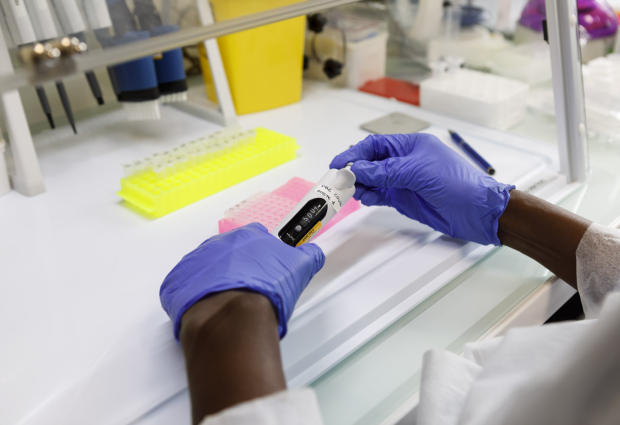
EMERGEN project
The emergence of SARS-CoV-2 variants, whose characteristics are likely to alter the epidemic dynamics in France, clearly shows the need to promote epidemiological and virological surveillance activities, and to strengthen genomic surveillance, in particular by genomic sequencing. This is essential for improving the control of infection risk in the general population and for informing decision-making in Health Care.
Last updated on 15 January 2024
Genomic surveillance and research into emerging pathogen infections
The EMERGEN (Consortium for surveillance and research on EMERgent pathogen infections via microbial GENomics) project, jointly coordinated by Santé publique France and the ANRS | MIE, is intended to deploy a genomic surveillance and research system on emerging pathogen infections (viral infections and, in the longer term, bacterial, fungal and parasitic infections).
Its goal is to foster a cross-disciplinary approach to surveillance and investigation activities of Santé publique France and the National Reference Centres (CNR).
Two main short-term objectives
- To describe and monitor the circulation of known SARS-CoV-2 variants down to the smallest possible territorial scale. To detect, identify and then monitor as quickly as possible the circulation of new variants of interest (i.e., those with functional consequences, in terms of transmissibility or pathogenicity for example). A list of priority targets is used to explore different populations (in towns and cities, in medico-social establishments, in health establishments) and to obtain the biological material and metadata required for sequencing activities and data interpretation.
- To promote and fund research projects within the consortium, in connection with new SARS-CoV-2 variant sequencing, focusing on certain aspects over others: experimental approach, animal models, cohorts, modelling studies and environmental aspect (waste water).
Three key pillars to implement this system
1. A sampling and collection strategy:
- Representative Flash surveys carried out across France (including overseas departments): in towns (samples from specialised biology laboratories; from the Sentinelles Network; from certain screening tests conducted in schools or universities; at borders, ports and airports), in social or medico-social establishments (EHPAD) or in hospitals (serious cases, carers).
- Particular attention paid to certain patient populations or infection profiles (immunocompromised patients, patients who have failed to respond to vaccines or antibody treatments, reinfections).
- Consideration of the environmental dimension (waste water), which is still a subject of study.
2. Setting up a limited number of sequencing platforms to perform sample analysis centrally, while maintaining territorial coverage:
- Four national sequencing platforms collect and analyse samples centrally for surveillance purposes (Flash surveys): two CNR respiratory infection virus laboratories (Institut Pasteur and Hospices Civils de Lyon laboratories), and two CNR expert laboratories for support in sequencing SARS-CoV-2 (Henri Mondor University Hospital (AP-HP) and the APHM infectious diseases unit in Marseille).
- The nationwide network of virology laboratories receives samples for sequencing in response to clinical needs (e.g., cluster cases) or clinical indications (e.g., re-infection, hospitalised cases, etc.): this local network, coordinated by ANRS MIE, is composed of around forty laboratories (university hospitals, hospitals, SSAs).
- Since 19 January 2021, some private medical biology laboratories have been able to enhance their local genomic sequencing capacity, at their ARS’ request. In addition, on 26 May, a call for expressions of interest was issued by Santé publique France, inviting private laboratories to take part in genomic surveillance using their sequencing capabilities (random selection).
Consulter l’appel à manifestation d’intérêt
3. The organisation of data management and integrative analysis, as well as the dissemination and sharing of results produced by sequencing facilities for epidemiological and research purposes by :
- A secure bioinformatics infrastructure, commissioned by Santé publique France. It was developed by the Institut Français de Bioinformatique (IFB), enabling data to be collected and shared for surveillance and research purposes, with timeframes adapted to each of these two segments of the project.
- Making data available to national and regional surveillance and research teams.
- Feeding into international databases (GISAID, ENA) according to defined data standards and Open Science principles
The infrastructure must be secure and allow data to be collected and shared for monitoring and research purposes, with timeframes tailored to each of these two segments of the project.
Members of EMERGEN Consortium
ANRS | MIE
Santé publique France
CNR Virus des infections respiratoires
(Institut Pasteur et Hospices civils de Lyon)
Laboratoires experts pour l’appui au séquençage du SARS-CoV-2
(APHP Henri Mondor, Créteil et APHM, Marseille)
Réseau des laboratoires de virologie ANRS | Maladies infectieuses émergentes
Institut Français de Bioinformatique
(IFB)
Inserm ITMO Technologie
Anses
Centre National de Recherche en Génomique Humaine
(CNRGH/CEA)
Unité des virus émergents
(UMR UVE, Marseille)
Réseau Sentinelles
Laboratories in the ANRS EMI network involved in the sequencing of SARS-CoV-2
Please note: Laboratory contact details are intended for healthcare professionals carrying out SARS-CoV-2 screening and who need to send their samples for sequencing to one of the ANRS network laboratories. To obtain this information, please send a request by e-mail to: ssr@anrs.fr
